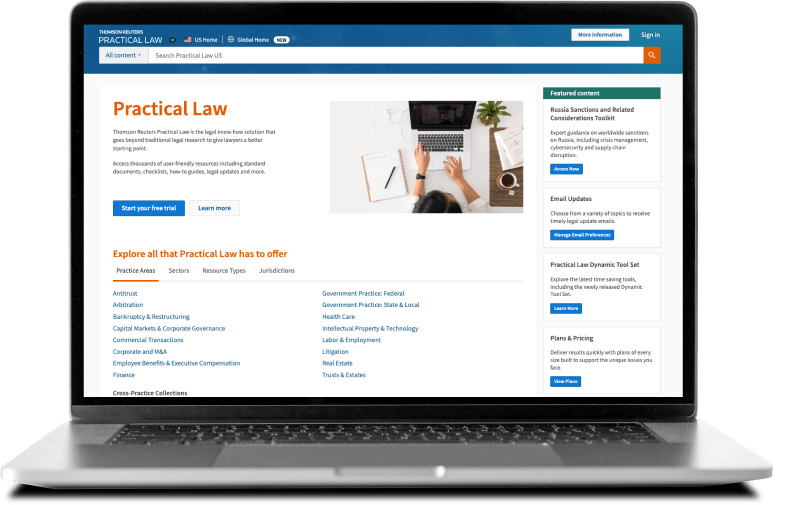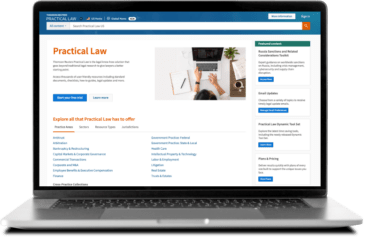In-house lawyers must bring more to the table than just good legal skills. Most companies are looking for their in-house legal team to partner with the business. To be successful in this role, you must also possess a set of key business skills. Here are some business skills all in-house lawyers should master.
Jump to ↓

CoCounsel Legal
Work smarter with CoCounsel, seamlessly integrated with Westlaw, Practical Law, Microsoft 365, and DMS partners
Go professional-grade AI ↗Basic Finance
Unfortunately, we must start with math. The business speaks its own language, and that language is numbers. You do not need an MBA, or a finance or accounting degree but you must have a certain comfort level with some critical financial concepts. Most importantly, you need to know how to read a balance sheet, a profit and loss statement, and a cash flow statement. Next, understand which finance formulas and metrics are most important to the business and learn those.
Get a good dictionary of financial formulas and terms.
Negotiation Skills
Of the many things they do not teach you in law school, basic business negotiation is high on the list. But, for some reason, everyone assumes that lawyers know how to negotiate. Negotiation skills must be learned (and honed). And if you want to be a successful in-house lawyer, it is critical that you know how to negotiate properly. Not only with the party on the other side, but internally – which is a much harder negotiation. Here are a few high-level things about business negotiation you need to understand:
- Everybody has to get something out of the negotiation.
- Negotiation is 90% preparation, 10% talking.
- Have a playbook.
- Take reasoned positions.
- Nothing is done until it’s all done.
Business Writing
One of the first things to do when you move in-house is to forget almost everything they taught you about legal writing in law school and at the law firm. It doesn’t work in the business world. I am not saying that you need to stop thinking like a lawyer. But, when you are translating those high-quality legal thoughts to paper (or email) you need to understand the following: First, your audience doesn’t really care about legal issues. Their tolerance level and attention span for whatever you are writing about is low. So, keep it short, to the point, and put the answer up front. Second, lose the legal jargon, the Latin words, the footnotes, the Blue Book citations, and your love of multiple alternative theories. Why? See the first point – no one cares. Third, keep things simple. You may wallow in the legal mud pit all day long, but the business doesn’t. So, don’t assume they know what you’re talking about and bring things down to the level of your audience, i.e., write so they can understand you. The goal of all writing is clarity. Aim for that.
Delegation
Most lawyers are not good at delegation. Primarily because either they think no one can do the work but themselves (false) or they view it simply as a way to get work off their desk onto someone else’s desk (bad). Smart businesspeople understand the true value of delegation and how to delegate work properly. To start, delegation is about teaching someone to do work that you have already mastered and there is little value to you or the business in you continuing to do it. Delegating properly frees you up to do more important things and allows the delegee to learn a new skill and enhance their value to the legal department. Here are the keys:
- Determine what you want to (and can) delegate (it must be work you have likely mastered and are in a position to pass along to someone new).
- Give clear instructions on what needs to be done and when it is due.
- Set-up check-in points so you can monitor progress and work quality.
- Review what they give you and give them constructive feedback.
Project Management
Lawyers are actually pretty good at managing projects. That said, we tend to manage projects like “lawyers” and not like businesspeople. There’s a difference. As lawyers, we tend to be worried mostly about the results, and that’s fine. But, the process you put in place to help ensure that the project is delivered on time, on budget, and as promised is something lawyers generally need to learn. This is why all in-house lawyers can benefit from learning the basics of project management. The key steps are: Kick-off meeting; scoping the project; planning the project steps; executing the project plan; monitoring the project; communicating progress; change management; and post-mortem (i.e., what can you do better the next time).
Soft Skills
To truly be successful in-house you must identify and master the right “soft skills” and bring those to the office with you every day. Here are a few critical soft skills to focus on:
- Active listening
- Approachability
- Sense of humor
- Emotional intelligence
- Decisiveness
- Proactivity
While the business may not be able to tell how good your legal skills are, they will be able to measure and evaluate your soft skills. And that is why they are so important to being successful in-house.
Critical Thinking
This is another skill where law schools fall short. The demand on in-house lawyers to become “strategic partners” to the business is only growing. The problem is no one teaches you how to do it. So, most in-house lawyers are left to their own devices to figure it out. Here are some things to focus on to develop critical thinking skills:
- Learn the business (i.e., truly understand how the business operates, the marketplace, and – most importantly – the company’s strategic goals and objectives for the next several years).
- Sharpen your financial acumen.
- Develop relationships within the business.
- Volunteer for strategic projects.
- Develop an understanding of “game theory” (you’ll need it!).
- Look at problems like a businessperson (with a law degree) trying to advance the interests of the business by either creating value or limiting value destruction.
It is imperative that in-house lawyers focus on developing business skills in addition to the legal skills they already bring to the table. But, be realistic. No one is going to master the list above in a month or even a year. It’s a process. Regardless, it is not a matter of if you will need these skills, it is a matter of when.

Practical Law
Get expert how-to guidance, clear explanations of current law, and time-saving tools and templates to give you a better starting point
View all plans ↗









